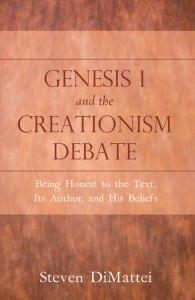Genesis 1:1-2:3’s depiction of the creation of the world was shaped by ancient Near Eastern cosmological perspectives and beliefs about the nature of the world and its origins. This fact the text itself bears witness to regardless of the opinions and beliefs of readers living millennia after this text was written. In other words, a thorough, honest, and objective analysis of the text of Genesis 1:1-2:3 on its own terms and as a product of its own cultural and literary world reveals rather convincingly that its creation narrative was shaped by cultural and subjective perspectives, biases, and beliefs about the nature of the world that were unique to the cultures and peoples of the ancient Near East.
It is not, in other words, a description of creation from the perspective of a supernatural deity residing outside of the cosmos, nor is it inspired by such a deity or point of reference. This is not a subjective claim that I am making or some whimsical theological postulate. Rather, these are the claims that the text itself advances when one reads and understands it from within its own cultural and literary context. It’s a shame that in today’s world it needs to be argued that ancient texts represent the views and beliefs of ancient peoples and cultures. Any cursory knowledge of these texts themselves, as well as the ancient cultures that produced them, would reveal this fact.





